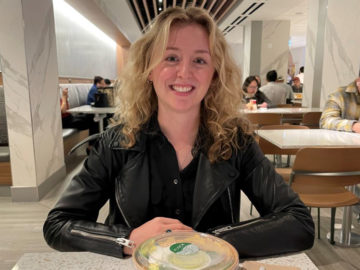Adult Allergies
What It Felt Like to Have COVID-19 with Asthma
In a mere 3 days, the virus took hold, with fever and difficulty breathing. As someone with asthma, the specter of hospitalization hung over each hour.

In retrospect, traveling to London in the midst of a global pandemic was probably unwise. I left for a long-planned trip on March 7, just as the spread of COVID-19 took off in Europe and the U.S.
At the time, the World Health Organization (WHO) still hadn’t recommended against traveling, despite some outbreaks in the United Kingdom. I was traveling with my boyfriend, Quinn, for a nice 10-day vacation. I have severe food allergies and asthma, so we took numerous precautions throughout the trip: wiping down airline seats with high-alcohol wipes, washing hands frequently, and hand sanitizer after transit rides.
We were both nervous and cautious. The trip turned out great. We enjoyed a lot of Nando’s, the famous chicken chain, and made many memories.
Our vacation was cut short when President Donald Trump announced the closing of U.S. borders to European nationals. We arrived home in Colorado on March 16, following a mad dash for airline seats. At the very end of the trip, Quinn began to present some mild symptoms of getting sick: an inconsistent fever and some fatigue. Once home, I began to self-isolate for the recommended 14 days, even though I had zero symptoms. It turned out to be the responsible thing to do.
Symptoms Start
The first week, I felt normal and healthy. But on the eighth day, I woke up to slight muscle aches down my legs and a touch of chest tightness. I thought it could be related to a yoga workout the day before. But as the day progressed, it did feel like I was getting sick.
I called my family doctor and asked about tests and treatment for COVID-19. They told me that given my asthma (a notable risk factor), they considered me in a “gray zone” since I was also young and generally healthy. They would not test me since our testing capacity in Colorado was abysmal.
Plus, the treatment would be the same: stay home, drink lots of fluid, and go to a hospital if I began to wheeze or have severe breathing difficulties. The nurse recommended that I double my standard steroid medication dose – I take Qvar – to twice per day for two puffs.
Over the next two days, symptoms consistent with COVID-19 progressed rapidly. A fever spiked, and it felt like I was having a consistent but mild asthma attack. This was when I began to feel anxious, as breathing began to feel more constricted by the hour. It felt like someone was gradually squeezing on my lungs. On my peak flow meter for asthma, I normally blow close to 800; by the third day of this, I was barely at 600.
Fear of Disease Progression
I began to develop a cough on March 26 – Day 3 of symptoms – that persisted for about a week. I also lost my sense of taste and smell. I was really nervous that the symptoms would further progress and I’d end up admitted to hospital. Just three days from zero symptoms to a persistent cough and some breathing difficulties was intense and frightening. What could happen in five days? I knew this virus could be deadly or intensely dangerous.
I scheduled a telehealth appointment on Day 4. The doctor recommended sitting in warm, moist air and using my rescue inhaler up to four times every day. My routine for my likely case of COVID-19 became: lots of sleep, lots of fluids, and lots of sitting in my bathroom with the door closed with a hot shower running to ease the cough and chest tightness.
I was cautiously watching my breathing for the next few days, with the specter of hospitalization hanging over each hour. Waves of coughing were followed by exhaustion. The symptoms of coughs or aches continued to be up or down, but gradually I stabilized. My fever finally broke.
It took about eight to 10 days from the first symptoms for the cough to subside, and another week before I felt normal. Over this same course of time, my boyfriend successfully fought off his sickness and thankfully escaped with only a fever and a loss of sense and taste.
I’m so grateful that I escaped the worst of symptoms and did not need to be hospitalized, although that was a definite fear as the symptoms progressed quickly. I do believe asthma made my symptoms more acute. I can easily imagine how this disease can create worse symptoms for those with additional risk factors.
My advice: Take this disease seriously. Please stay home and stay healthy!
Morgan Smith is a food allergy advocate and entrepreneur based in Colorado. See more of his writing at Allergicchild.com.
Related Reads:
Coronavirus & Asthma: How to Cut Risks and Keep Control
COVID-19 & Allergies Resources Hub


